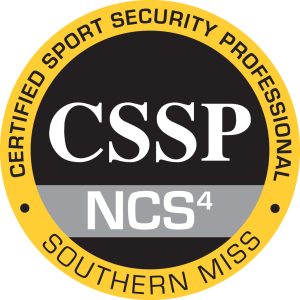Certified Sport Security Professional Certification

The NCS4 is the only organization that offers a certification recognizing expertise in sport security management. Earning the Certified Sport Security Professional (CSSP) designation sets you apart from other professionals and highlights your dedication to remaining current with industry trends. In addition to the distinction, you will be able to connect with other CSSPs on the private CSSP LinkedIn group and interact with industry experts through a complimentary subscription to NCS4 Connect. If you are in a mid- or upper-level position and create sport-security-related policies, procedures, training, and plans, the CSSP might be right for you.
Professionals in the sports security industry need to have a firm grasp of public safety measures and understand how to apply those measures in the unique environments created by sports venues and events. The CSSP certification validates expertise in the following domains:
- Business and Facility Management
- Emergency Planning
- Emergency Management
- Legal and Regulatory
- Crowd Management
- Security Principles and Practice
The CSSP certification is awarded to individuals who meet experience, education, and professional reference criteria and pass an exam relevant to sports safety and security management. It is maintained through ongoing continuing education and industry contribution requirements every three years.
The NCS4 invites you to explore the certification requirements to see if CSSP might be right for you.
The following links explain the application and recertification processes:
Please contact Daniel Ward at Daniel.L.Ward@usm.edu or (601) 266-5999 with questions.
Statement of Non-Discrimination
The NCS4 adheres to principles of fairness and due process and endorses the principles of equal opportunity. In administering the CSSP certification, the NCS⁴ does not discriminate or deny opportunity to anyone on the grounds of gender, race, age, religion, national or ethnic origin, marital status, veteran status, sexual orientation, or disability.